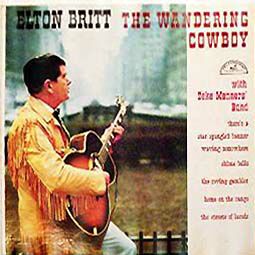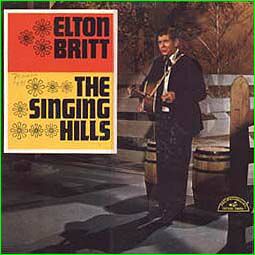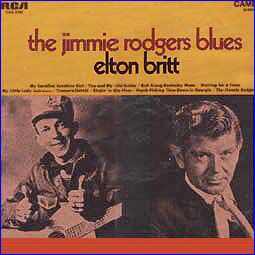


ELTON BRITT
Elton Britt was born
James Britt Baker in Marshall, AR, on June 27, 1913, and began playing guitar
and singing around his hometown while in his mid-teens. Baker's career was made
in 1930 when the Beverly Hill Billies returned from California to their Arkansas
home to recruit a new vocalist. He won the talent search, and after being
renamed Elton Britt, spent three years performing and recording with the Hill
Billies. Britt moved to New York in 1933, initially playing in a quartet named
Pappy, Zeke, Ezra & Elton. He recorded later in the '30s, as a solo act and also
with the Wenatchee Mountaineers, Zeke Manners' Gang, and the Rustic Rhythm Trio.
Britt began his period of fame in 1939, thanks to two circumstances: his
signature on a contract for the discount label RCA Bluebird and — most
importantly — his friendship with songwriter/producer Bob Miller. Miller wrote
all of Elton Britt's greatest early hits, including "Chime Bells," "Rocky
Mountain Lullaby," "Buddy Boy," "Driftwood on the River," and in 1942, "There's
a Star Spangled Banner Waving Somewhere." The latter was adopted as a symbol of
the war effort by patriotic audiences — much as "Over There" had served World
War I sympathizers. President Franklin Roosevelt even invited Britt — billed as
"the World's Highest Yodeler" — to the White House in 1942 to perform the hit.
By the time the charts came into existence in 1944, though, Britt had peaked. He
did hit the Country Top Ten 11 times during the last half of the '40s, but never
topped the charts. "Someday" reached number two in 1946, and six other songs
peaked in the Top Five, including the double-sided "Wave to Me, My Lady"/"Blueberry
Lane," "Detour," "Gotta Get Together With My Gal," "Candy Kisses," and "Quicksilver."
A re-recording of his early hit "Chime Bells" hit number six. Britt continued
recording with RCA, eventually releasing over 50 albums until 1957, when he
moved to ABC/Paramount.
The careers of Elton Britt and Lloyd Green only crossed shortly in the late 60's, when Elton made a brief recording comeback. He even scored two more minor hits in 1968/69 with "Jimmie Rodgers Blues" (#26) and "The Bitter Taste" (#71) before his passing in 1972.


